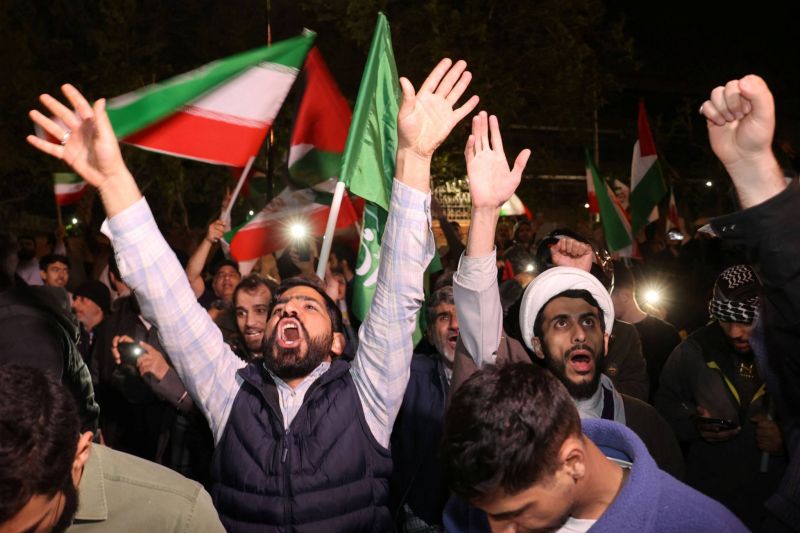
Supporters of the Iranian strikes against Israel cheer and wave Iranian and Palestinian flags in Tehran, April 14, 2024. (Credit: Majid Asgaripour/Wana)
It was a sleepless night in the region. After a suspenseful two weeks following the Israeli attack on the Iranian embassy in Damascus, Iran carried out its long-awaited retaliation on Saturday night.
This was the first time in its history that the Islamic Republic launched a direct attack against Israel. With several hundred drones and a dozen cruise missiles, the attack was designed to create a spectacle and calibrated with the aim of restoring Iranian deterrence — all while avoiding a large-scale escalation. Was the mission successful? How do we interpret what has happened in the last 12 hours? And what consequences will this operation have for the region?
The facts
• Shortly before 11 p.m. on Saturday evening, Iran carried out its first ever direct attack against Israel, its sworn enemy. Since 1979, Iran has used its proxies and allied militias in the region to fight Israel. Operation "True Promise" was carried out in retaliation for the Israeli attack on Iran's embassy in Damascus, which killed seven members of the Revolutionary Guards, including a senior commander of the al-Quds force, Mohammad Reza Zahedi.
• All-in-all, the Islamic Republic launched "more than 300 missiles and drones" towards Israel in the operation, according to the Israeli army. "Ninety-nine percent of them" were intercepted by Israel and the United States.
• Iran fired dozens of ground-to-ground missiles toward Israel, the majority of which were intercepted by Israel outside its borders. The Israeli air force intercepted more than 10 cruise missiles, also outside Israel's borders, according to the Israeli army.
• The Jordanian air force shot down dozens of Iranian drones flying across northern and central Jordan towards Israel, Reuters reported, citing two regional security sources.
• An Israeli base in southern Israel suffered minor damage, the army said. According to a hospital spokesperson, cited by the New York Times, a total of 12 people were brought in to the Soroka Medical Center in southern Israel overnight. A 7-year-old girl was seriously injured by missile fragments. Initial reports misidentified her as a 10-year-old boy. Earlier reports said the child was injured by shrapnel from an interceptor missile in the Negev desert. The girl was taken to the operating room and was under intensive care. Eight other people were treated for minor injuries from shrapnel or running for shelter.
• The Yemeni Houthis are also said to have launched drones towards Israel in "coordination" with Iran. This would appear to be the only Iranian ally to have taken part in Operation True Promise. Hezbollah launched a salvo of rockets from southern Lebanon in response to Israeli strikes, but this is part of the ongoing confrontation between the two sides since Oct. 8.
• Israeli, Jordanian, Iraqi, and Lebanese airspace was closed. By noon on Sunday, all had announced their reopening. Iranian airspace remained open but has been largely avoided by commercial airlines.
• The Revolutionary Guards declared that the operation was "part of the punishment" inflicted on Israel for its "crimes." For its part, the Iranian Foreign Ministry said that "Tehran will not hesitate to take further defensive measures to safeguard its legitimate interests against any military aggression."
• "Our commitment to Israel's security in the face of threats from Iran and its proxies [in the region] is unwavering," wrote US President Joe Biden on social network X, posting a photo of an emergency meeting with his national security team at the White House.
• A senior White House official told Axios that in a phone call on Saturday between Biden and Netanyahu, the former said the US would not support an Israeli counterattack against Iran, citing fears that a subsequent Israeli attack would lead to a regional war.
• A senior Israeli official said there would be a "significant response" to the Iranian attack.
• Saudi Arabia called on all parties to show the "highest level" of restraint.
The stakes
• While clearly flexing its muscles, pushed to respond by Israel's unprecedented embassy attack, Iran's retaliation nonetheless appears to have been strategically calculated to avoid any real regional escalation. With a few hours' travel time, Tehran gave Israel and its allies the opportunity to intercept the projectiles before they reached their targets.
• Despite how the attack was staged and the numerous warnings given, removing the element of surprise, it nevertheless constitutes a turning point. The Israeli-Iranian war is officially coming out of the shadows, although it remains to be seen how intensely it will be fought and whether it will be fought in the open.
• The symbolic power of this attack and its impact on the region, with images of Iranian missiles flying over the Dome of Jerusalem, should not be underestimated. It does not, however, indicate that Iran has succeeded in restoring its deterrence capabilities against Israel.
• For the time being, a full-scale escalation seems to have been avoided. That said, everything will now depend on the intensity and extent of Israel's response.
Possible consequences
• The Israeli-Iranian war is likely to monopolize international headlines, pulling focus away from the carnage that has been unfolding in Gaza for the past six months. This will likely bring Israel out of its diplomatic isolation, with strong support from its major allies, particularly the United States.
• Israel will want to retaliate with increased aggression in order to dissuade Iran from carrying out this type of attack on its territory again. However, the United States, which is heavily involved in this conflict, is likely to intervene, wanting to avoid another Iranian retaliation in return. To what extent will Washington be able to control its Israeli ally, who may be tempted to gamble on a regional war? This is the main issue at stake over the next few hours and days.
• In retaliation for the operation, Israel could carry out a direct attack against Iran. "Discussions are underway," the Israeli army announced at dawn. This could involve military targets or key infrastructure. Israel is also likely to step up its operations against Iran's allies in the region, particularly in Lebanon.
• It's also possible that Iran or its allies in Iraq may carry out an operation in Jordan to punish the kingdom for its participation in the destruction of its drones as they passed through Jordanian airspace en route to Israel.
